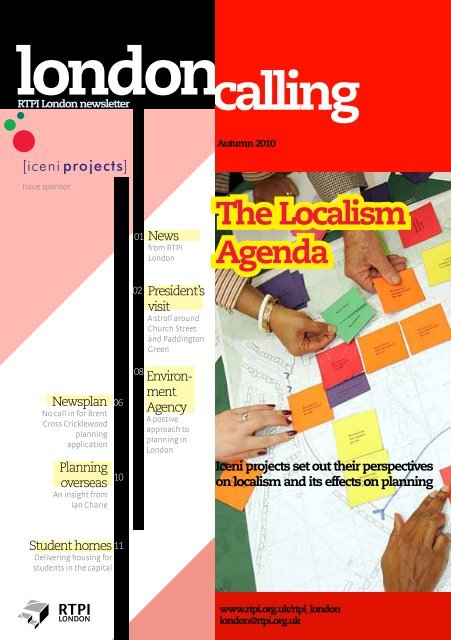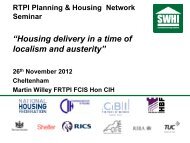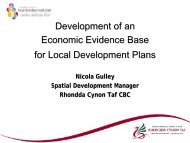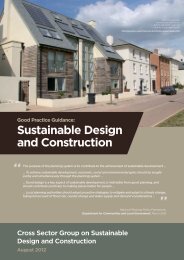london - Royal Town Planning Institute
london - Royal Town Planning Institute
london - Royal Town Planning Institute
Create successful ePaper yourself
Turn your PDF publications into a flip-book with our unique Google optimized e-Paper software.
tpi.org.uk/rtpi_<strong>london</strong>RTPI London newsletterAutumn 2008Autumn 2010Issue sponsorNewsplanNo call in for BrentCross Cricklewoodplanningapplication<strong>Planning</strong>overseasAn insight fromIan Charie061001 Newsfrom RTPILondon02President’svisitA stroll aroundChurch Streetand PaddingtonGreen08EnvironmentAgencyA postiveapproach toplanning inLondonThe LocalismAgendaIceni projects set out their perspectiveson localism and its effects on planningStudent homes11Delivering housing forstudents in the capitalwww.rtpi.org.uk/rtpi_<strong>london</strong><strong>london</strong>@rtpi.org.uk
CommentJames BompasWelcome to the Autumn 2010 edition ofLondon Calling.Whilst the localism agenda gathers paceit is still unclear how it will functionand whether it will truly benefit localcommunities. With the hasty revocationof the Regional Spatial Strategies (RSS) it is essentialthat mechanisms are progressed to surmount stagnatedhousing delivery and deliver major infrastructure.These anxieties are not just shared by the planningprofession. In fact, 29 national bodies, including the BritishProperty Federation, National Housing Federation andCampaign to Protect Rural England have all put their nameto collective concerns raised by RTPI about statements ofintent by the coalition Government.In discussing and imparting these and other changes RTPILondon will provide its members with access to free oraffordable events. The first, to discuss the demise of theRSS, promises to be a success, with support from SJ Berwin(details to follow). And, for those seeking more activenetworking opportunities, then the annual 5-aside footballwill not disappoint.As the Region looks forward to promoting a more frequentand greater range of events, I would also like to express mygratitude to those volunteers that have supported RTPILondon in recent months. For those wishing to get involvedthen please get in touch as the Region would welcomeyour support.I hope you enjoy this edition of London Calling.James Bompas is Chair of RTPI LondonWant to get involved?<strong>Royal</strong> <strong>Town</strong> <strong>Planning</strong> <strong>Institute</strong> LondonPO Box 57863LondonSE23 9ALTel +44(0)20 8613 8357Email <strong>london</strong>@rtpi.org.ukWeb www.rtpi.org.uk/rtpi_<strong>london</strong>Chair: James Bompas, Thurrock ThamesGateway Development CorporationSenior Vice Chair & Newsletter Editor: TomVenables, AECOMJunior Vice Chair: Sara Eustace, CB RichardEllisHon Secretary & University <strong>Planning</strong>Schools Liaison Officer: Richard Lemon, CBRichard EllisHon Treasurer: VacantImmediate Past Chair: Rachael Rooney, GLARepresentative on General Assembly:Meeta Kaur, SJ BerwinDeputy Representative on GeneralAssembly: Laura Smith, The LandscapePartnershipEvents Manager: Hannah Baker, Indigo<strong>Planning</strong>Deputy Events Manager :Will Smith, TurleyAssociatesDeputy Newsletter Editor and DeputyRepresentative on London <strong>Planning</strong> andDevelopment Forum: Jonathan Manns,Knight FrankRepresentative on <strong>Planning</strong> Aid for LondonManagement Committee: Jon Barker, Atikins/ Becky Penty, Sports EnglandRepresentative on RIBA London Urbanism& <strong>Planning</strong> Group: Maria Boyce, UrbanInitiatives / Joanna Chambers, BroadwayMalyan /Jonathan Manns, Knight FrankInternational Officers: Susie Saraiva / ZoeGreenWeb Page Editor: Becky Beer, UrbaninitiativesRepresentative on London <strong>Planning</strong> andDevelopment Forum: Brian Whitely, LondonBorough of NewhamDeputy University Liaison Officer: CarolineHuett, Indigo <strong>Planning</strong>Consultations Secretary: VacantYoung Planner Representative: RobynBlackburn, <strong>Planning</strong> PotentialMember without portfolio: Andrew Dorian,Transport for LondonRegional Coordinator: Lucy Barton, RTPIRTPI London is looking for experienced planners, particularly those working for Local <strong>Planning</strong> Authorities to joinits Regional Activities Committee (RAC). As an RAC Member you will be influential in shaping the way that RTPILondon is run. It also presents a great opportunity for networking opportunities.For more information, please contact Lucy Barton on <strong>london</strong>@rtpi.org.uk or 0208 613 8357.
RTPI London NewsNews from the RTPI London Region01RTPI London Annual General MeetingThe RTPI London AGM is scheduled for Tuesday23rd November. If you wish to attend pleaseemail Lucy Barton -<strong>london</strong>@rtpi.org.ukHampstead Garden SuburbConservation Area AdvisoryCommitteeHampstead Garden Suburb CAAC have avacancy for an RTPI nominated member.The CAAC considers and assesses planningapplications within the Hampstead GardenSuburb Conservation Area. If you are interestedin this role please contact Michael Balla-Goddard via the Hampstead Garden SuburbTrust Office, 862 Finchley Road, London, NW116AB.RTPI London and AECOM launchresilient city seriesThe series to be held at AECOM’s office in HattonGarden will feature experts from AECOM andguest speakers who will set out a toolkit forplanning for future city resilience. The lectureseries is as follows::12th October - Naturally Resilient Cities: Anintegrated approach to green infrastructure andclimate change planning.16th November - Watering It Down: <strong>Planning</strong> forsustainable water managementt14th December - Low Carbon <strong>Planning</strong>: Anupdate on planning for climate change andcarbon reduction.For more details contact <strong>london</strong>@rtpi.org.ukRTPI LONDON & INDIGO ARE PROUD TO PRESENTTHE RTPI LONDON5-A-SIDE FOOTBALL TOURNAMENT 2010Sponsored byFRIDAY 24 SEPTEMBER 2010STARTS AT 6PMKICK OFF AT 6.30PM‘Goals’ Wimbledon, Beverley Way, New Malden,near Wimbledon, KT3 4PHABOUT THE EVENTo The RTPI London Five-A-Side Football Tournament 2010 will be played at ‘Goals’Wimbledon, one of London’s premier five-a-side football venueso The tournament will bring together planners and other built environment professionalsfrom across LondonWHO CAN ENTER THE TOURNAMENT?o To enter the tournament you’ll need one squad of seven players per organisation, whowork in or are seeking work in planning or a related built environment profession, suchas architecture, surveying, GIS or development economics.o At least three players in each squad should be members of the RTPI London.Each squad should also include at least two female players and two male players.HOW MUCH DOES IT COST?o This is a free event but a deposit of £70 will be payable by each squad in order toregister. The deposit will be returned to participating teams on the evening of thetournament..HOW TO ENTERo To enter, complete the booking form and post it along with the deposit cheque to:Lucy BartonRegional Co-ordinatorRTPI LondonPO Box 57863SE23 9ALwww.rtpi.org.uk/rtpi_<strong>london</strong>Registered Charity In England And Wales: No. 262865Registered Charity In Scotland: Sc037841<strong>london</strong> calling RTPI London Newsletter Autumn 2010
President’s VisitAs part of the annual RTPI President’svisit to London, Ann Skippers metwith planners working on the ChurchStreet and Paddington Green MasterPlan in Westminster, writes RebeccaBeerChurch Street is a colourful andvibrant neighbourhood in the heartof London – with a bustling streetmarket, a successful antiques tradeand a wealth of different cultures.In the past, however, it has been asomewhat forgotten neighbourhood,with rising levels of deprivation,unemployment and long-termillness.Westminster City Council has just launchedits Housing Renewal Strategy, which makesa pledge to invest in the Council’s poorestneighbourhoods - the regeneration of ChurchStreet is an absolute priority. Urban Initiativeswere appointed to prepare the Futures Planfor Church Street and Paddington Green.The Futures Plan will set out a vision for theRTPI President, Ann Skippers, with Maria Boyce and Rebecca Beer from Urbanthe London Regional Activities Committeefuture of the neighbourhood – a vision sharedand endorsed by all those with a stake in thearea, from local residents to business owners,school children, politicians and Council officers.Work on the Futures Plan has been progressingover the past few months - most recently aCharter for the future of the neighbourhood hasbeen launched and more detailed options arecurrently being prepared and consulted on.RTPI London spent a morning showing AnnSkippers the good work currently underwayin Church Street. The event was kindly hostedby the Showroom Gallery, located right in theheart of Church Street. Maria Boyce, from UrbanInitiatives, led the presentation, which gavea flavour of the issues and opportunities theproject team has been grappling with in the
03Initiatives, the Futures Plan Young Ambassadors, and other members ofneighbourhood. Maria also outlined the waysin which the team have imaginatively engagedwith the wider community, and particularly withyoung people. This includes the appointmentof three young locals who are now workingalongside Urban Initiatives to ensure that theirwork is reflective of the needs and aspirations ofthe younger population.Following the presentation the President wastaken on a walkabout of the area. This gave heran opportunity to see some of elements touchedupon in the presentation, as well as the qualitiesthat Church Street already has in abundance– the buzz of the market, the quirkiness of theantiques shops, and the friendliness of the localsamongst many other things.<strong>london</strong> calling RTPI London Newsletter Autumn 2010
“With Great Power comes GreatResponsibility” - Localism and<strong>Planning</strong>Daniel Olliffe of Iceni Projectssets out his opinion on theemerging localism agenda.Let’s begin by facing facts. Localism is nothingbut a NIMBY charter pandering to the whims ofcommunities, it will not stimulate housebuildingnor will it create a more accountable system.It will simply put power in the hands of localcommunities who will resist development at allcost.Regional Spatial Strategies have been scrapped,local authorities have dropped housebuildingfigures with immediate effect. Developmentswill not be promoted and the economy willstagnate. Whichever way you look at it, Localismis not good and should not be welcomed.....Now before you all call 118 118 and ask for thenearest careers advisory centre, or type ‘Whatother jobs can I do with a degree in <strong>Town</strong><strong>Planning</strong>?’ into Google, I would urge you to readon.Localism in TheoryThe Localism Agenda looks like being here tostay, and if the prophecies are true, will be unlikeanything we’ve experienced before. Yet localempowerment is nothing new.If, as a profession, we think back to the GardenCity Movement, planning was about thebuilding of communities through, put simply,the planning of towns. Engagement has beena key foundation upon which the professionhas grown, and a reversion to the principleof this is to be welcomed. Whilst the localistagenda extends beyond planning to all aspectsof communities and government, the planningsystem is an obvious vessel to carry thispolitical message.At its heart, Localism is about localempowerment and responsibility; giving asay back to those communities, who have feltneglected and helpless to deal with genuinelocal issues. And in this context it is difficult toargue that it is a bad thing for planning.Localism could spell the end of the ‘BlameGame’, the buck will stop firmly withcommunities and their locally electedmembers. If people feel empowered, instead ofconsistently objecting to what they feel to bedevelopment that is imposed upon them, theprospects may increase of them being willingto contribute to positive planning within theircommunity. Consultation should thereforebecome a fundamental tenet of planning, asopposed to a box to be ticked in the pursuit of aplanning permission.
5Consultation shouldtherefore becomea fundamentaltenet of planning,as opposed to abox to be tickedin the pursuitof a planningpermission.In embracing this change, the role of planningand planning professionals will be key. Localcommunities may know what they want butnot how to achieve them. Planners can guidethe community through this process, takinga stewardship role and holding the hand ofcommunities in respect of future development.This role equally applies to both professionalswithin thepublic and private sectors, whohave responsibility to facilitate the process ofengagement and development.Equally, planners have a collective responsibilityto advise communities on what is needed withinan area. Far from stifling development, Localismmay stimulate development in areas wherethere is an identified local need, empoweringpreviously disempowered people to seize theopportunity to shape the places in which theylive.But the Government must beware of creatingFrankenstein’s Monster through Localism. Itis clear to see how Localism will allow localcommunities to object to development they donot like and feed positively into the developmentprocess, but what happens when a communitycomes out in force to demand the delivery of adevelopment which has not fitted historically<strong>london</strong> calling RTPI London Newsletter Autumn 2010with planning policy and the views of planningofficers within an area?Picture the scene; a local community havefor a number of years wanted an Ikea in theirBorough but policy precludes out–of-townretail developments. Under the new agenda,the community identify an area of underusedrecreational space and submit a petition forsuch a development to the local authority.If Localism is about empowering localcommunities, such favourable support could otbe ignored. What happens in such a situation?This example could apply widely and must be akey consideration for the future. The principleof Localism implies such a development wouldbe allowed to proceed despite any perceivedconflict with planning policy. Afterall, the peoplewill have spoken, and localism cannot simply bea tool for locally elected members to say no.The message is clear, Localism is an agenda to bewelcomed, but only if central Government, localauthorities and communities remember thatwith great power comes great responsibility.<strong>Planning</strong> remains fundamental to this process toguide communities in the right direction.Daniel Olliffe is an Associate at Iceni Projects Ltd. The viewsexpressed in this article are his own. .
news planshare your news with us -email: <strong>london</strong>@rtpi.org.ukLONDON BOROUGH OF BARNETIn the first test of the newGovernment’s commitmentto localism, CommunitiesSecretary Eric Pickles decidednot to ‘call in’ the applicationfor redeveloping the BrentCross shopping centre. Thedevelopment, which wasapproved by LB Barnet’splanning committee last year,will deliver 7,500 new homesand a new and extendedshopping centre, along with newoffices and new schools. Work isexpected to commence in 2014.LONDON BOROUGH OFKENSINGTON AND CHELSEACapco’s plans for redeveloping Earl’sCourt are progressing with theappointment of Terry Farrell andAssociates as masterplanners for thesite.Managing political andcommunity relations forLondon’s property industryOffering an in-depth knowledge of all 32 Boroughsand the City of London, Green Issues Communicationsis one of London’s leading planning and developmentcommunications specialists. Our core services include:Local Government Public AffairsPolitical and stakeholder liaisonInnovative community engagement programmesMedia Relations and Crisis ManagementElections analysis and insightMulti-disciplinary communications supportGreen Issues is part of College PublicPolicy and the College Group – one ofthe world’s leading multi-disciplinarycommunications agencies and ‘EuropeanCorporate Consultancy of the Year 2010’(The Holmes Report).For further information on our servicesplease contact Will Scawn of Green IssuesCommunications on 020 7457 2036 or atwills@greenissues.com
7LONDON BOROUGH OF CAMDENThe sale of High Speed 1, the rail linkbetween St Pancras and the FolkestoneChannel Tunnel, has begun with thegovernment opening the bidding processfor the asset..LONDON BOROUGH OF TOWER HAMLETSThe London Thames Gateway DevelopmentCorporation approved Tesco plans for a majornew mixed-use scheme in Bromley-by-Bow. Thedevelopment will include more than 450 new homes,an expanded supermarket, a school, hotel andriverside park.CITY HALLWith the Mayoral election less than two years away,the Labour party began its search for a candidateto take on Boris Johnson for control of London’splanning powers. Former Mayor, Ken Livingstoneand the former MP for Bethnal Green and Bow,Oona King, are regarded as the frontrunners. Theother candidates are Seton During, a former Enfieldcouncillor, and party activist Emmanuel Okoro.LONDON BOROUGH OF RICHMONDThe Local Elections in the capital on 6th May saw one Boroughsubstantially buck the London-wide trend. Despite a poor resultfor the Conservatives in general across the city – losing controlof five councils in total, including all but one of those gainedin 2006 – the Conservatives regained control of LB Richmond,presumably on the back of the Zac Goldsmith ticket. Richmondwill be an interesting authority to watch over the next four years,particularly given that it receives the lowest Government grant ofall the London boroughs.<strong>london</strong> calling RTPI London Newsletter Autumn 2010
Environment Agency: A positiveapproach to planning in LondonIn response to ongoing change in the planning system, EnvironmentAgency’s London planning teams have been changing the way theywork for several years, writes Charlotte AmorThe predicted impacts of climate change toLondon mean we need to find opportunitiesfrom the planning system to help ourcommunities adapt. This has led to moreinnovative ways of working and we haveproduced guidance, toolkits and case studies.We’d like to share some of our initiatives withyou. As the new Government have stated in theirProgramme for Government that climate changeis ‘one of the gravest threats we face’, we callfor closer collaboration on planning for climatechange.With economic recovery high on everyone’sagenda, it is vital that regeneration of ourcommunities takes place, with improving theenvironment and addressing the challengesof climate change being an integral part. Wesee regeneration as a key driver for improvingLondon’s environment.Adopting a positive approach is one of the mainways we do this, focusing on shared outcomesand pragmatic approaches to problem-solving.We want to be viewed as helpful and positive,providing specialist advice on importantenvironmental issues. We can share our skillsand knowledge of environmental issues andclimate change by working more closely with ourstakeholders.We are currently reviewing our ‘Guide forDevelopers’ which is on our website. Thiscontains advice for developers on a varietyof environmental issues and opportunities,bringing together links to guidance and casestudies from across England and Wales.Meanwhile, our Green Roof Toolkit wascommended at the RTPI awards, and thepartnership project the London Rivers ActionPlan won in the Adapting to Climate Changecategory.These initiatives are driven by a need to findintegrated solutions to challenges from climatechange, including flood risk, rising temperatures,risks to water resources and water qualityand biodiversity. It’s really important that wecelebrate good practice as a sector to show whatcan be achieved through positive planning. Lastyear we published good practice case studies ofdevelopment in London, written in collaborationwith developers.Not that it’s always that straightforward. Withdelays to the implementation of some approvedschemes in London because of the economicclimate, it’s harder to negotiate environmentalenhancements and actually see them delivered.We are striving to achieve a balance betweeneconomic constraints and environmental gains.
09For those of you in London’s local authorities,you may have noticed Environment Agencyofficers being more visible – in a literal sense.We are doing monthly surgeries at counciloffices (desk space depending!) and runningregular technical seminars on environmentalissues, flood risk being the main one. Thiswill be increasingly important as the newFloods and Water Management Act comesinto force and local authorities gain newresponsibilities for managing local flood risk, akey recommendation of Sir Michael Pitt’s reviewof the 2007 floods.For the private sector, we have also beenpromoting our pre-application service todevelopers and our goal is to place ourrequirements and aspirations on the table asearly as possible in the design process. We’vevery much embraced the pre-applicationapproach and have integrated it into ourworking practices in London, seeing a hugeincrease in pre-application consultations inrecent years. Strategic meetings and technicalseminars with key London developers is alsosomething we find is mutually beneficial. For us,it’s about being more proactive and transparentabout what we are seeking for the environmentthrough redevelopment.Our office serves all London’s boroughs anddevelopers. Its enables us to meet regularlywith our customers and ensures we can providea localised and responsive planning service,responding to 3,200 consultations last year, Wetake a risk based and outcome focused approachto our work in strategic planning, with our floodrisk standing advice allowing us to focus on thehighest risk applications.We have restructured our London planningteams and increased our focus on providingefficient customer service. By seeking feedbackwe are able to target areas for improvementand pilot new ways of working, which arealso identified by regular assessment of theenvironmental results being achieved. In thisyear’s annual customer service survey found85% of the councils we serve in London rated ourplanning service as either good or excellent.We also focus on positive input to plan making,using flood risk and environmental evidenceto help councils address these issues at astrategic level. We want to increase partnershipworking with the boroughs and developers toensure the environment is improved throughredevelopment and help our communities adaptto a changing climate.Planners have a central role in responding toclimate change and finding solutions to mitigateand adapt to its effects. While climate changeand the environment have an increasingly highprofile within the planning sector, we need tocontinue to embed climate change adaptationinto spatial planning. To do this we need towork together to develop effective policies andshare good practice. As planners in Londonwe have a responsibility to shape the futureof the environment. We need to build strongpartnerships, and as a leading environmentalbody the Environment Agency has an importantrole to play. We want to be part of a positiveplanning system where development canbe seen as helping to deliver environmentalimprovement.The EA guide for developers can be found at www.environmentagency.gov.uk/developersCharlotte Amor is a major projects officer with the EnvironmentAgency in London<strong>london</strong> calling RTPI London Newsletter Autumn 2010
interview/Ian CharieIan Charie reflects on a varied career that has taken him from theDocklands to New Orleans and provides tips on planning overseasIan Charie started his career with Stoke-on-Trent Council, where he worked for a yearbefore moving to London. After a year withLB Wandsworth, he spent the next decadeworking for the London Docklands DevelopmentCorporation (LDDC), a period which was tobecome a career highlight - major regenerationon a massive scale with unprecedented publicfunding and delivering massive change. Butnew challenges beckoned and he assumeda range of other consultancy roles at BartonWillmore, Atkins, URS and BDP. This resulted infurther Docklands work and working closely withhousing developers, successfully representingthem at public inquiries.Being married to an American, it’s hardlysurprising that he looked over the pond for hisnext challenges and he moved to Boston in 2006.Despite no-one being brave enough to offer hima job before he moved, he quickly landed on hisfeet, working for a leading Boston based firmcalled Goody Clancy. This led to seven months asSenior Project Manager on a series of <strong>Planning</strong>and Infrastructure studies undertaken in NewOrleans, in the wake of Hurricane Katrina.He is now working to build a new planningbasedbusiness within the multi-disciplinaryconsulting firm Jacobs (who are also active inmany parts of the UK).What drew you to work in New Orleans/America?Quality of life and cost of living are both muchbetter, although there are, of course, lots ofdifferences. I miss decent newspapers, newsreporting, the British sense of ‘nationalism’ and,of course, being at Premiership football games(and the pub! Working in New Orleans was reallya case of ‘right place, right time.What have been the key challenges workingin New Orleans/America?I was at the recent National American<strong>Planning</strong> Association (APA) Conference in NewOrleans. RTPI President Anne Skippers gave apresentation along with her US and Canadiancounterparts which left me feeling proud to be aBritish planner!The reality is that the US hardly believes inproactive urban planning: most is merelyreactive and takes the form of specificinfrastructural work: environmental, transport,airport, military planning, etc. Rounded,comprehensive urban planning does exist, buton a much smaller scale and often without theforce of law. Integrated land use and transport/infrastructure planning is the exception ratherthan the norm.The challenges in New Orleans were many: thesheer scale of the challenge, the ‘raw’ emotionalcontext for trying to rebuild communities (someneighbourhoods almost from scratch), thefractured bureaucracy and inadequacy of publicagency resources for moving things forwardandan impossible 6 month timetable.What lessons have you learnt?Always to be open minded and flexible aboutwhat life may throw at you and stick to keyplanning basics (people, place, process) inwhatever planning challenges you face.
11Are there any lessons from the US thatcould be applied to London and UK planningpractice in general?Sadly, not really. They can learn a lot from us. Notleast that the public interest has to sit firmly atthe centre of good decision making – rather thanthe interests of a certain minority or sector.How difficult is it to get a job as a planneroutside the UK?It’s all about the networking. UK planners arehugely respected, and have a great deal to offer.The US has been a tough market for gettingwork. But for anyone who wants a change it is arewarding, enjoyable and fun experience.What advice would you give to any Londonplanners who would like to work abroad?There are plenty of opportunities where thedevelopment market is more active: the MiddleEast, China, India. As global market conditionsimprove, further development opportunities willarise needing <strong>Planning</strong> inputs at every level andscale. Do your homework, think about what youwant, find a good headhunter... or, like me, justgo and trust things will work out!What skills did you bring to your work in theUS?A good, solid base of understanding theimportance of an integrated approach tophysical, environmental, economic and socialplanning being vital – combined with alwaysthinking of people and community first and thatyou have to find a way round bureaucracy or‘process’ road blocks.What do you think are the challengesfacing planners, both at home and on aninternational stage?It is stating the obvious, but planning iscentral to making politicians, decision makers,developers and all other stakeholders realisethat with climate change, environmentalconsequences of man’s action and a scarcity ofall resources that our decisions regarding landuse, infrastructure and transport are critical toachieving future success.What are your future career plans?With poor employment prospects in the US, Iam taking up a 12 month role with my previousemployer Atkins in Bahrain, leading a teamimplementing a National 30 year plan.Do you have any views you would like to sharewith London planners?London is a great city, with much best practicefor other urban areas to learn and gain from. Gospread the word! But don’t all leave: London stillneeds the carefully, crafted hand of continuinggood urban planning!<strong>london</strong> calling RTPI London Newsletter Autumn 2010
Opinion: The Trouble with StudentsTodayAsk the average person on the street to describewhat they most associate with “students”and you’ll most likely go away with reinforcedstereotypes involving daytime TV and copiousamounts of alcohol consumption. Yet in Londonthese popularist images are being challengedby the increasing number of internationalstudents who are attracted to study in Londondue to its Sassen inspired Global City status andaim of becoming a Global Knowledge Capital.The international appeal of London is clearlyreflected in the 40% increase in students fromabroad enrolling at London based universitiessince 2001 contributing to the 260,000 fulltimeuniversity students that now study in theCapital.The 2008 version of the London Plan clearlyrecognises the strong social, cultural andemotional ties that form between a studentand the particular city within which theystudy. This relationship puts universities in aprivileged position of playing a direct role inattracting and retaining those students - andfuture employees - with the skill sets necessaryto ensure that London remains a globallycompetitive city. The planning system in Londonhas an important role to play in ensuring thatuniversities are provided with flexible andproactive policies which allow them to continueto offer internationally competitive educationalfacilities.There are a myriad of factors that cumulativelycontribute to the attractiveness of a particularuniversity to both domestic and internationalprospective students. The availability, qualityand cost of student accommodation is one of thekey factors that determines the competitivenessof a particular university – and university city– against its rivals. A research paper publishedby Knight Frank and entitled “London StudentLiving” paints a challenging picture whereLondon suffers from a chronic undersupplyof student housing to the extent that only20% of students can be offered universityaccommodation. In real terms this has resultedin 200,000 students in London being unableto access purpose-built accommodation. Withthe international university sector being socompetitive, will London be in a position tocompete with comparable cities such as NewYork and Sydney when attracting the highestquality academic students?The 2008 London Plan – and whisper this– appears to take a fairly pragmatic andflexible approach to student housing deliveryrecognising not only that there is a severeaccommodation shortfall which requiresaddressing with a supportive planning policycontext but also that if this shortage of purposebuiltstudent accommodation continues, it willplace greater pressure on the private housingsector, with students increasing their occupancyof HMOs and private rental properties. Giventhat there is little debate regarding the severelack of affordable housing (in the broadestsense of the word) in London it follows thatthe planning system should be doing all itpractically can to address the clear correlationbetween the lack of bespoke student housingand the occupation of HMOs and private rentalproperties by students.Again the 2008 London Plan appears torecognise the link between student housing andthe occupation of private rental properties bynot requiring affordable housing in associationwith student housing schemes. The rationale isclear – student housing schemes do contributeto the availability of affordable housing byfreeing up private rental properties previouslyoccupied by students due to lack of available
13Provision of studenthousing willassist in pluggingLondon’s affordablehousing shortage..bespoke accommodation. On the surface, the2009 consultation draft of the replacementLondon Plan appears to reiterate this approachwith new student housing provision being seenas key to reducing pressure on other parts of thehousing stock currently occupied by students.However, tucked away in the supporting textis the assumption that unless a proposal forstudent accommodation is secured through alegal agreement for occupation by membersof specified educational institutions fora predominant part of the year, then thedevelopment will normally be subject to therequirements of affordable housing. Thisrequirement for affordable housing risks makingany proposal for student accommodation thatis not associated with a particular universityunviable thus potentially further exacerbatingthe supply of student accommodation. Whatthe replacement London Plan fails to recogniseis that the shortage of student accommodationis most acute for international, postgraduateand research students who often studyindependently from the institution with whichthey are enrolled. The type of accommodationsought by such students is commonly notcampus based or tied to a particular institutionwhere rooms are provided cheek-by-jowl<strong>london</strong> calling RTPI London Newsletter Autumn 2010alongside more enthusiastic first year students,but is rather higher quality, independent livingaccommodation which prioritises the quality ofthe living and studying environment.It is precisely this type of private, independentstudent accommodation that meets anidentified need that may be discouraged frombeing brought forward on viability grounds dueto the requirement for affordable housing. Thereis a real risk that this approach will exacerbatethe lack of accommodation available to thosestudents, who are internationally based or atan advanced stage of study, who are forced intothe private rental sector. The London Plan mustrecognise that independent student housingfor which there is a clear demonstrable need– especially if brought forward on commercialsites – will contribute to affordable housing byreducing pressure on the private rented stockby those students who can not access bespokestudent accommodation. The requirementfor on-site affordable housing risks placingadditional cost burdens on such schemes thatultimately cater for a type of housing need that,if left unaddressed, will continue to impact uponthe availability of affordable housing in thecapital.John Richards is an Associate with Knight Frank, The viewsexpressed in this article are not necessarily the views of the RTPI.
Young PlannersYoung Planners Summer Social EventsThe RTPI London Young Planners Group hosted apub quiz on the 3rd June . “Harry’s Hat”, from theconsultancy Roger Tym & Partners won the quiz.Second place was “Eric Pickles”, a team fromWestminster City Council, and in third place was“In a Pickle”, a team from Colin Buchanan. Thiswas followed up by a world cup themed drinksreception for delegates at this years <strong>Planning</strong>Convention. Further events are planned for theAutumn. To join the mailing list email robyn.blackburn@planningpotential.co.ukLondon Young Planners launch theirFacebook siteThe RTPI London Young Planners Group haverecently launched their own Facebook site,the site will provide an excellent opportunityfor on-line networking, details of forthcomingYoung Planners events, news items and an idealforum for discussion. There are plans to launcha weblog which will be incorporated into theFacebook site facilitating discussion aroundmajor planning issues at a loca,l regional andnational level.To join the Group, please search for ‘LondonYoung Planners’ on Facebook.Logo competitionThe RTPI is delighted to announce the launch ofthe London Young Planners logo competition.We are looking for a distinctive design torepresent the London branch of the RTPI YoungPlanners network to a national audience ofplanners, policy makers and built environmentprofessionals. The winning design will be used inprinted and on-line promotional material, on theRTPI website and on our new Facebook page.We are inviting all planning students, all RTPIstudent and licentiate members, and RTPIcorporate members under the age of 35 to enter.The winning logo design will be revealed whenthe website re-launches at the end of 2010.Entries are welcomed from individuals as well asteams of up to four people.Designs should comprise of a logo (including thewords London Young Planners), a colour scheme,and a written description of the thinking behindthe design. They should be submitted in highresolution pdf or JPEG format.The deadline for entries is 15th October.For further information, please contact theLondon Young Planners Representative, RobynBlackburn:robyn.blackburn@planningpotential.co.ukYoung Planners’ Conference 2010, 15thand 16th October, CardiffYoung Planners Cymru have brought togethera range of exciting speakers, workshops andstudy tours to give delegates a whole range ofopportunities to learn, experience and debatethe role of localism in the planning system.Visit: www.rtpi.org.uk/ypconference for morenformation, for a brochure and to download abooking formYoung Planners’ Conference 2011London BidThe London Young Planners’ Steering Groupis pleased and excited to announce that it iscompiling a bid for submission to the RTPI tohost the Young Planners’ Conference 2011. Webelieve that London is the most appropriatevenue for the 2011 conference in advance ofthe 2012 Olympics. We are currently looking forvolunteers to assist with the bid and conferenceorganisation if we are successful. Please contactsara.parkinson@cbre.com or robyn.blackburn@planningpotential.co.uk for more details.
Wine Tasting with thePresident1513/05/08Vivat BacchusAs part of the Ann Skippers visit to London, RTPI Londonorganised a wine tasting event at Vivat Bacchus in LondonBridge. Many thanks to the venue and our sponsors theOyster Partnership. Here are some photos for those whocan’t remember the evening.Notice of annual general meeting of the London region of the<strong>Royal</strong> <strong>Town</strong> <strong>Planning</strong> <strong>Institute</strong>To be held on Tuesday 23rd November 2010 at from 6.30pm at theSavoy Tup, 2, Savoy St (off the Strand), London, WC2R 0BA (nearestTube: Temple/Embankment/Covent Garden)Agenda1. Welcome from the Chair2. Apologies for absence3. Minutes of the Annual General Meeting 20104. Presentation of Annual Report for 20108. Chair’s Closing RemarksAll RTPI London members are welcome to attend and participatein the AGM. At the discretion of the Chair, members of other RTPIregions and other planners are welcome to attend the AGM asobservers.Nomination forms for the election of Principal Officers and RegionalActivities Committee members are available from the HonorarySecretary who can be contacted at <strong>london</strong>@rtpi.org.uk The AGM willbe followed by some social drinks from around 7.30pm. All plannersand planning students are very welcome.5. Treasurer’s Report for 20096. Election of Principal Officers (Regional Management Boardmembers)7. Election of Regional Activities Committee members<strong>london</strong> calling RTPI London Newsletter Autumn 2010
past events14/05/10Kings Cross TourAs part of the RTPI President’s time in theregion, the branch organised a visit to the King’sCross regeneration area. The masterplan areacomprises 67 acres of land, defined by St Pancrasand King’s Cross railway stations and the landenclosed by the lines which sweep out fromthem. The meeting point was the Grade 2 listedGerman Gymnasium on Pancras Road, and arepresentative from the developers, Argent, gavea full background to the site history and theproposed future.The development is the most significantdevelopment in central London, comprisingnearly 8 million sqft of mixed use development,20 new streets and 10 new public spaces andthe refurbishment of 20 historic buildingsand structures. Argent described the longand protracted process of assembling thesite, overcoming political and communityreservations through the planning process,the ever-present and ongoing issue of meetingplanning conditions and obligations amongsta host of many other planning and landrelated issues not uncommon with major sitedevelopment. Members present challenged,amongst other things, the engagement with thecommunity and the range of uses proposed onthe finished area.The walking tour took in the Pancras Roadand, over the Regent’s Canal, onto a circularroute around the Western and Eastern transitsheds and into the Coal Drops. The formeris at an advanced stage of construction andrefurbishment, with the University of the ArtsLondon scheduled to take it over in due course.The latter is envisaged as a primarily retail spacealong the lines of Covent Garden.During the walk around, the scale andcomplexity of the regeneration really beganto become apparent. Amongst the huge tasksahead include the dismantling, restoration anderection of the iconic gas holders, which are tocontain both residential development and publicrealm, and the completion of the huge publicsquare between the new Arts building and theRegent’s Canal.But what also became apparent were the smallscale interventions going on to maintain interestin the community locally and to attempt todemonstrate a continuing dynamic in what is,at the strategic view, a slow moving process.This included the ‘skip gardens’ outside thegymnasium which involve local schoolchildren,and have started to distribute produce to someof the local contractors on the site.The tour was an enlightening visit to a key site inwhich the region’s planners are actively engagedat many spatial levels. The informal event, aswell as focusing on the development itself, alsoreflected on the changing political context forplanning and speculated on what the futuremight hold with the many changed mooted.What is clear is that Ann Skippers has a verybusy time ahead, not only promoting the roleof planning in major investment such as King’sCross, but also in promoting, from the core of the<strong>Institute</strong>, the significant role and specialist skillsthat planners hold.Richard Crutchley
17specialist town planning recruitment in LondonRandstad Construction, Property & Engineering has an established background in <strong>Town</strong><strong>Planning</strong> and Urban Design. Formed of two specialist built environment recruitmentorganisations Hill McGlynn & Beresford Blake Thomas (BBT); together we have an enviablepresence and reputation within the construction, Property & Engineering sectors.Our <strong>Town</strong> <strong>Planning</strong> team has almost twenty years of combined experience and are able tooffer advice to both candidates and clients at every step of the recruitment process. Whetheryou are looking for your first <strong>Planning</strong> job or need to staff an entire office, one of ourdedicated consultants can assist.Public Sector & Central GovernmentDevelopment ControlPolicy & StrategicEnforcementConservationUrban DesignMinerals & WasteRegenerationValidations / <strong>Planning</strong>S106Interim <strong>Planning</strong> ManagementEconomic DevelopmentPrivate SectorTelecomsRetailCommercialResidential RegenerationProject ManagementUrban Design<strong>Planning</strong> DirectorMinerals & WasteEnvironmentalInfrastructureFor more information, please contact one of our team on 0203 206 9112 or by email at:c.chinnappen@randstadcpe.com / q.bouwer@randstadcpe.com / j.burrows@randstadcpe.comwww.randstadcpe.combringing together<strong>london</strong> calling RTPI London Newsletter Autumn 2010
Events24/09/2010 – RTPI London 5-AsideFootball Tournament 2010, Goals,WimbledonThis event is now sold out.11/10/2010 – RTPI London YoungPlanners APC Seminar, DTZ, 125 OldBroad Street. (nearest station – Bank)Representatives from the RTPI will outline ina presentation, guidance on the APC processincluding, the log book, submission documentand PDP. This will include dos and don’ts andhelpful hints and tips. There will be ampleopportunity for questions and answers. Themeeting will also be attended by APC assessors.Resilient Cities Series, AECOM, 77Hatton Garden, London (nearest tubeFarringdon/Chancery Lane)12th October - Naturally Resilient Cities: Anintegrated approach to green infrastructure andclimate change planning.16th November - Watering It Down: <strong>Planning</strong> forsustainable water managementt/14th December - Low Carbon <strong>Planning</strong>: Anupdate on planning for climate change andcarbon reduction.To attend any of the above events, or to join our mailing list email<strong>london</strong>@rtpi.org.ukA positive approach to consultationDevelopment must meet the objectives and aspirations of communities,individuals and Councils. Iceni Communications utilises ground level planningmethods to strengthen grass roots engagement with the development process.For more information on Iceni Communications, please contact JamesWaterhouse on 0203 008 5042.
















